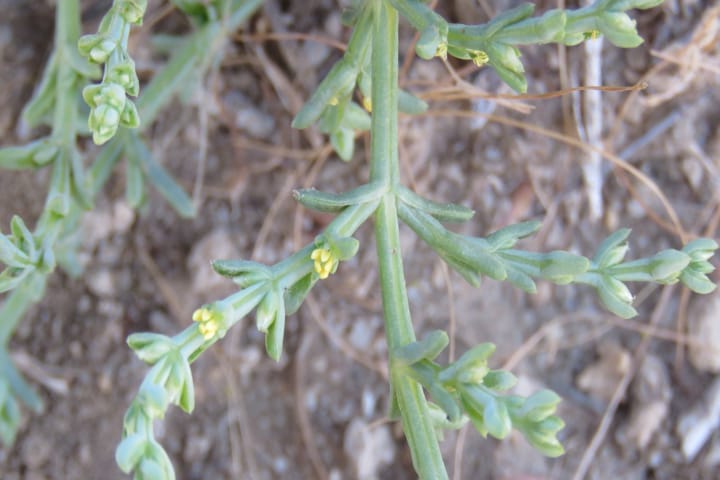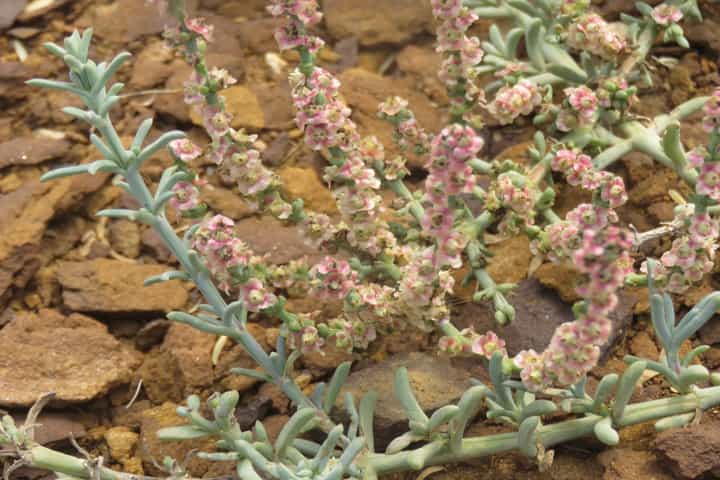

This new species of Salsola discovered by Gujarat Ecological Education and Research Foundation scientists is the sixth type of this genus that is found in India
A team of scientists from Gandhinagar-based Gujarat Ecological Education and Research Foundation made a remarkable discovery in the Great Rann of Kutch. In the salt marsh in Gujarat, they found an unrecorded plant species of Salsola oppositifolia Desf, a plant which thrives in saline conditions and hence called a halophyte.
This new species is a perennial shrub that adapts to saline environs and grows in the arid to semi-arid environment of the Kutch district. Incidentally, this is the sixth species of Salsola genus to be found in India.
Belonging to the family of Amaranthaceae, Salsola oppositifolia Desf has been included in the latest issue of Plant Discoveries, 2022, published last month. This annual publication has been brought out by the Botanical Survey of India since 2007.
The publication mentions that this species, which is known to grow in Italy, Northern Africa, Palestine, Spain and Western Sahara, has been reported for the first time from India. The new species was confirmed by a BIS scientist.


The researchers in the team that found this species in three different places in Rann of Kutch, included R.K. Sugoor, Director of GEER Foundation, Ketan Tatu, Principal Scientist, and Rakesh Gujar and Vinesh Gamit, botanists.
Sharing details about this plant, Sugoor told India Narrative: “Presently this species is recorded from the arid region of Great Rann of Kutch in rocky and pebble-dominated hilly outcrops. In this habitat, the temperature goes up to 50 degrees Celsius in the summer season.”
He added that this “perennial succulent or flesh woody shrub can grow up to 2 metres, has branches that are usually erect and has a stem which is smooth, erect and quadrangular in shape. There are nodes and internodes on the stem. Its leaves are opposite each other on each node and are silvery green, juicy, roughly in shape and slightly pointed at apex. The flowers of this plant blossom at the junction point of leaf and stem and are yellow coloured while its fruits are winged. The flowering and fruiting season starts in October and ends in January.”
When asked about the importance of this new species, Sugoor informed India Narrative that “this species, with other Salsola species, is used as raw material for making Soda Ash (Sodium Bicarbonate), which is useful in manufacturing lye and sops. Many species of the genus Salsola/Soda contain pharmacological properties and are used as raw material. This species would be useful for pharmaceutical industries.”
Highlighting its use as a medicine, the Director said: “Salsola species are traditionally used as anti-hypertensive, anti-inflammatory, and immunostimulants in some countries.”
Going beyond this, he said the shrub is very useful for the ecology. “It acts as a soil binder in arid regions and plays an important role in initial stages of ecological succession by growing and surviving in rocky and pebble-dominated hilly outcrops. As this species is adapted to grow in harsh conditions, it is useful for restoration of degraded saline lands. It is likely that by acting as a pioneer plant in ecological succession, it helps in further growth of other plant species.”
The other Salsola species found in India are Salsola kali, Salsola hatmanii, Salsola monoptera, Caroxylon imbricatum (Salsola baryosma) and Halogeton glomeratus (Salsola glomerata).
Details of this discovery appeared in Journal of Threatened Taxa published by Wildlife Information Liaison Development Society which is based in Coimbatore, Tamil Nadu.
The leadership team from the Central Tibetan Administration (CTA) arrived in Tokyo to participate in…
Hailing the centre's fight against naxalism and red terror, Prime Minister Narendra Modi said that…
Defence Minister Rajnath Singh aboard India's first indigenously built aircraft carrier, INS Vikrant, on Friday…
In a coordinated operation, the North West District of Delhi Police apprehended 38 Bangladeshi nationals…
A recent report by the Tibet Action Institute has unveiled troubling evidence of mistreatment, forced…
Heavy rain lashed many districts of Kerala on Friday, disrupting normal life and causing waterlogging.…